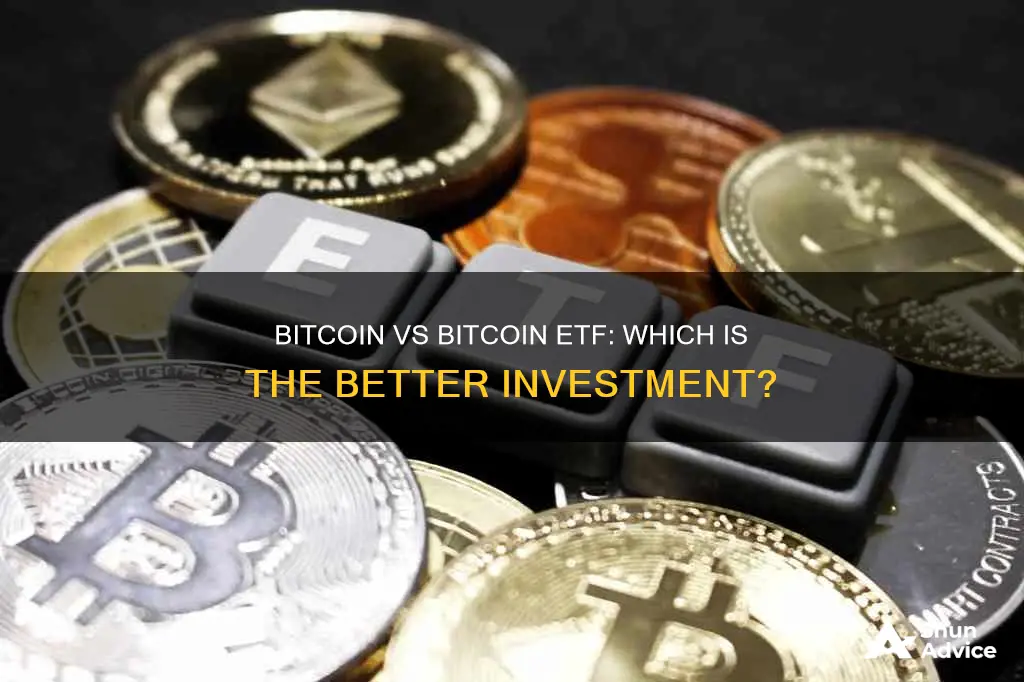
Bitcoin ETFs have been one of the hottest topics in the investment world over the past few years. In January 2024, the U.S. Securities and Exchange Commission (SEC) approved the first spot Bitcoin ETFs, allowing investors to gain exposure to the price of Bitcoin without directly owning the asset. This has sparked a debate among investors about the benefits and drawbacks of investing in Bitcoin ETFs compared to buying and holding Bitcoin directly.
On one hand, Bitcoin ETFs offer a more familiar and regulated investment vehicle for those who want exposure to Bitcoin's price movements. They trade on traditional exchanges like the New York Stock Exchange during regular trading hours, and investors don't have to worry about storing and safekeeping their Bitcoin. Additionally, ETFs can be included in specialized portfolios like retirement or 401(k) plans. However, there are acquisition fees associated with Bitcoin ETFs, and investors don't own the underlying Bitcoin. There might also be a premium on the ETF compared to the Bitcoin net asset value (NAV), and trading hours are limited compared to the 24/7 trading of Bitcoin.
On the other hand, buying Bitcoin directly provides investors with full ownership and control over their BTC. It offers unlimited trading hours, lower fees, and direct exposure to the BTC price. However, storing and safekeeping Bitcoin can be challenging and requires higher technical expertise. Additionally, Bitcoin cannot be included in traditional retirement plans and 401(k)s, and it is not recognized as a financial instrument in all jurisdictions.
Ultimately, the decision between investing in Bitcoin ETFs or buying Bitcoin directly depends on an investor's individual preferences, risk tolerance, and level of comfort with the crypto space. Both options offer unique advantages and disadvantages, and it's essential for investors to carefully consider their investment goals and constraints before making a decision.
| Characteristics | Values |
|---|---|
| Trading hours | Bitcoin trades 24/7. ETFs can only be traded during traditional US trading hours. |
| Ownership | With ETFs, investors don't own the underlying BTC. With Bitcoin, investors have direct ownership of BTC. |
| Fees | ETFs have higher fees than buying Bitcoin directly. |
| Security | ETFs are backed by regulated and reputable providers. Self-custodying Bitcoin can be challenging and requires higher technical expertise. |
| Use | ETFs can be included in specialised portfolios like retirement or 401(k). Bitcoin can be used as a currency for payments or transfers. |
| Exposure | ETFs provide exposure to the price of BTC. Bitcoin provides direct exposure to the BTC price. |
| Complexity | ETFs are simpler to buy and sell than Bitcoin. |
What You'll Learn

Bitcoin ETFs vs direct investment in Bitcoin
Bitcoin ETFs and direct investment in Bitcoin have their own advantages and disadvantages. Here are some of the key differences between the two:
Trading Hours
Bitcoin is a cryptocurrency that trades 24/7, 365 days a year. On the other hand, Bitcoin ETFs trade within traditional US trading hours, typically during regular market hours, as they are traded on regulated exchanges such as the New York Stock Exchange. This means that investors in Bitcoin ETFs may miss out on major price swings that occur outside of regular trading hours.
Ownership and Control
With direct investment in Bitcoin, investors gain full ownership and control over the BTC they buy. They can choose to store it in a cold wallet or transfer it to an exchange for trading. In contrast, investors in Bitcoin ETFs do not own the underlying BTC. The ETF provider, such as BlackRock, owns and stores the BTC, and investors essentially buy exposure to the price of BTC. This means that investors in Bitcoin ETFs do not have the same level of control over their investment and must defer to the ETF provider's management strategy.
Fees and Costs
Both options involve fees, but the types of fees differ. Direct investment in Bitcoin typically involves trading fees associated with buying and selling BTC on a cryptocurrency exchange. These fees vary depending on the exchange. Bitcoin ETFs, on the other hand, involve acquisition fees stipulated by the ETF provider, as well as the fund's expense ratio. These fees tend to be higher than the transaction fees on cryptocurrency exchanges.
Convenience and Simplicity
For investors who are new to crypto or who are not tech-savvy, Bitcoin ETFs offer a more convenient and simpler way to gain exposure to Bitcoin. Investors can purchase Bitcoin ETFs through their regular brokerage accounts, just like they would with any other stock or ETF. In contrast, direct investment in Bitcoin requires setting up a crypto wallet and navigating cryptocurrency exchanges, which can be complicated and time-consuming for those who are not familiar with the process.
Regulatory Considerations
The regulatory landscape for crypto is constantly evolving, and this can impact the availability and performance of both Bitcoin ETFs and direct investment in Bitcoin. For example, the approval of spot Bitcoin ETFs by the SEC in early 2024 was a significant development that opened up crypto investing to a wider range of investors. However, the unregulated nature of crypto markets remains a concern for regulators, and changes in regulations could impact the availability and performance of crypto investments.
In conclusion, the decision between investing in Bitcoin ETFs or directly in Bitcoin depends on the investor's individual preferences, level of comfort with technology, investment goals, and risk tolerance. Both options offer advantages and come with certain trade-offs, so it is essential for investors to carefully consider their options before making any investment decisions.
Get Free Bitcoins: Easy Ways to Earn Without Investment
You may want to see also

The pros and cons of Bitcoin ETFs
Bitcoin Exchange-Traded Funds (ETFs) have become a popular investment vehicle for those looking to gain exposure to Bitcoin without directly purchasing the cryptocurrency. Here are some of the pros and cons of investing in Bitcoin ETFs:
Pros:
- Simplified Investment and Accessibility: Bitcoin ETFs provide simplified access to Bitcoin, allowing investors to gain exposure to its price movements without the technical complexities of crypto wallets and exchanges. This makes it appealing to traditional investors and those new to cryptocurrencies.
- Regulatory and Security Benefits: Bitcoin ETFs, especially those approved by regulatory bodies like the U.S. Securities and Exchange Commission (SEC), offer a higher standard of reliability and security compared to direct cryptocurrency investments. They mitigate regulatory risks and ensure transparency and compliance, creating a more secure investment environment.
- Market Integration and Liquidity: Bitcoin ETFs are traded on traditional stock exchanges, providing liquidity and a familiar trading environment for regular investors. They also present opportunities for institutional investors, further integrating Bitcoin into mainstream financial markets, potentially leading to more stable prices in the long term.
- Diversification and Tax Benefits: Bitcoin ETFs allow for diversification within investment portfolios. Some include Bitcoin futures and stocks, offering balanced investment options. Additionally, certain Bitcoin ETFs regulated by the SEC may offer tax efficiency, providing financial incentives.
Cons:
- Control and Ownership: One of the biggest drawbacks of Bitcoin ETFs is that investors do not own actual Bitcoin, which contradicts the decentralization principle of cryptocurrencies.
- Cost Implications: Bitcoin ETFs come with management fees and operational costs that can reduce net returns for long-term investments. These fees tend to be higher than those associated with direct Bitcoin purchases.
- Market Hours Limitation: Unlike the 24/7 cryptocurrency market, Bitcoin ETFs are limited to the stock market's operational hours, which can result in missed opportunities due to Bitcoin's constant price fluctuations.
- Tracking Errors: While Bitcoin ETFs aim to replicate Bitcoin's price movements, discrepancies known as tracking errors can occur, leading to potential misalignments with the actual market performance of Bitcoin.
- Limited Trading Options: Bitcoin ETFs only track the price of Bitcoin and cannot be traded for other cryptocurrencies, limiting investors' ability to adapt to market trends quickly.
Strategic Bitcoin Investment: Long-Term Commitment
You may want to see also

How to invest in Bitcoin ETFs
If you want to invest in Bitcoin ETFs, there are a few steps you should follow. Firstly, it's important to understand the difference between buying Bitcoin directly and buying a Bitcoin ETF. When you buy a Bitcoin ETF, you are buying exposure to the price of Bitcoin, rather than owning the underlying asset. This means that you won't have the same level of control over your investment, but it can be a simpler and more accessible way to gain exposure to the cryptocurrency market.
- Choose a Bitcoin ETF: Research and compare different Bitcoin ETFs available in the market. Consider factors such as fees, performance, and the reputation of the provider. Examples of Bitcoin ETFs include Grayscale Bitcoin Trust (GBTC), iShares Bitcoin Trust ETF (IBIT), and ProShares Bitcoin Strategy ETF (BITO).
- Open a Brokerage Account: You will need a brokerage account to purchase a Bitcoin ETF. Choose a reputable broker that offers the Bitcoin ETF you want to invest in. Take note of the fees and services provided by the broker.
- Fund Your Brokerage Account: Once your brokerage account is open, you will need to add funds to it. You can typically fund your account through an online transfer from your bank account or using payment apps like PayPal.
- Purchase the Bitcoin ETF: Search for the ticker symbol of the Bitcoin ETF you want to buy within your brokerage account interface. Enter the number of shares you want to purchase and place a buy order.
- Monitor and Manage Your Investment: After purchasing the Bitcoin ETF, keep track of its performance over time. You can choose to hold your investment for the long term or trade it based on market conditions. Remember that investing in Bitcoin ETFs carries risks, and the value of your investment can go up or down.
It's important to note that Bitcoin ETFs are traded on traditional stock exchanges during regular trading hours. The price of a Bitcoin ETF may not always match the exact price of Bitcoin due to the independent nature of the ETF market. Additionally, fees associated with Bitcoin ETFs can vary, so be sure to review the prospectus or offering document before investing.
Strategizing Bitcoin Investments: A Beginner's Guide
You may want to see also

Bitcoin ETFs vs Bitcoin futures ETFs
Bitcoin exchange-traded funds (ETFs) are pools of Bitcoin-related assets offered on traditional exchanges by brokerages to be traded as ETFs. The goal of these ETFs is to give retail and other investors exposure to cryptocurrencies without needing to own them. Bitcoin ETFs are traded on stock exchanges, providing investors with diversified exposure to various asset classes and the flexibility to buy or sell shares throughout the trading day at market prices.
On the other hand, Bitcoin futures ETFs are exchange-traded funds that aim to offer exposure to the price movements of Bitcoin. These ETFs use futures contracts, which are standardised contracts where two parties agree to exchange a specific quantity of Bitcoin at a specific time and price in the future. Fund managers purchase these contracts and bundle them into a fund.
The first Bitcoin-linked ETF was the Proshares Bitcoin Strategy ETF (BITO), which mainly uses futures contracts. It was approved by the SEC in October 2021 and is listed on the New York Stock Exchange.
One of the main advantages of Bitcoin futures ETFs is that they allow more people to invest in Bitcoin without the necessary expenses and hassles of buying them directly. They eliminate the need for security procedures and excessive funds, while still providing a familiar investment type. Additionally, Bitcoin futures ETFs are traded on traditional markets, allowing institutional investors to invest in Bitcoin, albeit indirectly through futures contracts.
However, there are also some disadvantages to investing in Bitcoin futures ETFs. One limitation is tracking error, which refers to the discrepancy between the performance of the ETF and the actual price movement of the underlying Bitcoin futures. This can be due to management fees, transaction costs, or logistic issues in replicating prices. Another disadvantage is regulatory uncertainty, as the regulatory landscape for cryptocurrencies is still evolving and changes in regulations can impact the legality, trading, and valuation of Bitcoin futures.
In summary, while Bitcoin ETFs provide investors with exposure to cryptocurrencies without the need to own them, Bitcoin futures ETFs specifically offer exposure to the price movements of Bitcoin by using futures contracts. While Bitcoin futures ETFs have the advantage of being more accessible to a wider range of investors, they also come with certain limitations and risks, such as tracking errors and regulatory uncertainty.
The Future of Crypto.com Coin: Is It Worth Investing?
You may want to see also

Bitcoin ETFs vs other crypto ETFs
Bitcoin ETFs are a relatively new addition to the world of exchange-traded funds. While Bitcoin ETFs tied to futures on the cryptocurrency have been around since 2021, it was not until January 2024 that U.S. regulators allowed exchange-traded products tied directly to the day-to-day movement of Bitcoin prices, known as the asset's spot prices.
Bitcoin ETFs provide investors with direct exposure to the price movements of Bitcoin, the best-known cryptocurrency. These funds either hold Bitcoin directly or track its price through futures contracts, allowing investors to benefit from Bitcoin's price appreciation without storing the cryptocurrency themselves.
On the other hand, blockchain ETFs, which are also a type of exchange-traded product, offer more diversified exposure to the broader blockchain industry across sectors like finance, supply chain management, and healthcare. Blockchain ETFs primarily track the stock market prices of companies that have invested in blockchain technology, such as Visa and Honeywell.
One key difference between Bitcoin ETFs and blockchain ETFs is their focus. Bitcoin ETFs are more focused on providing direct exposure to the price movements of Bitcoin, while blockchain ETFs offer a more diversified exposure to the broader blockchain industry.
Another difference lies in their volatility. Bitcoin ETFs tend to be more volatile, as they are directly affected by regulations and price movements in the Bitcoin market. On the other hand, blockchain ETFs are relatively stable compared to the volatility of Bitcoin since they are not exposed to Bitcoin's price swings.
In terms of availability, Bitcoin ETFs are available in the U.S., with the Securities and Exchange Commission (SEC) approving the first spot Bitcoin ETFs in January 2024. However, there are no Bitcoin ETFs in the EU due to the legal framework provided by the UCITS directives, which require a minimum level of diversification.
When investing in any ETF, it is important to consider the expense ratio, which is the fee paid by investors. Lower expense ratios are generally preferable as they reduce returns.
Overall, both Bitcoin ETFs and blockchain ETFs provide investors with exposure to the cryptocurrency and blockchain space, but they differ in their focus, volatility, and availability.
Coinbase Alternatives: Exploring Crypto Investment Platforms
You may want to see also
Frequently asked questions
When you buy Bitcoin, you get full ownership and the freedom to transfer it any time. You can also use it for payments or transfers between exchanges and store it indefinitely in cold storage. When you buy a Bitcoin ETF, you get a store of value that you can buy and sell when the market is open. It's stored with management fees, so your stash will decrease over time and the other properties of Bitcoin are unavailable to you.
The pros of a Bitcoin ETF are that it is a regulated financial product, it can be included in specialised portfolios like retirement or 401(k) plans, and it is backed by regulated and reputable providers like BlackRock. The cons are that investors do not own the underlying Bitcoin, there might be a premium on the ETF compared to the Bitcoin net asset value, and there are limited trading hours and higher fees.
The pros of buying Bitcoin directly are that you get direct ownership of the Bitcoin you buy, you can get full control through self-custody, there are unlimited trading hours and lower fees. The cons are that storing your Bitcoin can be challenging and requires higher technical expertise, you can't include it in traditional retirement plans and 401(k) plans, and it is not recognised as a financial instrument.







